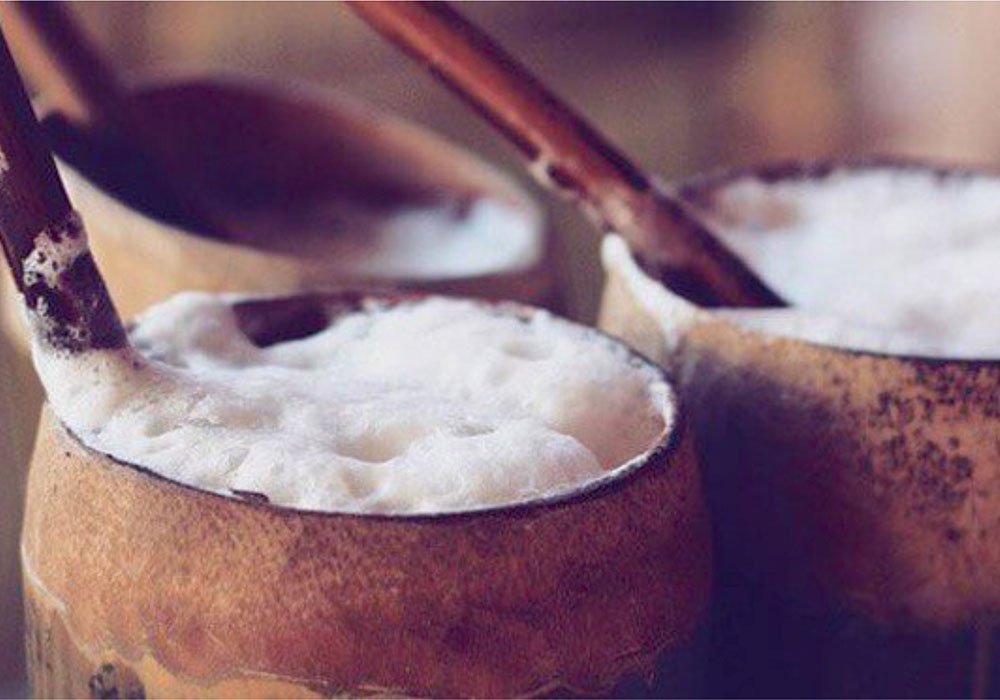An Overview of Traditional Rice Beer From North-East India

Rice beer is an ethnic symbol of North-East India’s rich and diverse culture. Brewed using traditional methods, rice beer is consumed by the natives of North-eastern tribal communicates that inhabit the mountains, especially the foothills of Himalayas. These fermented rice beverages go by various names in different tribal communities, for example, it is called Chubitchi by the Garo tribe of Meghalaya, Choko by the Rabhas tribe of Assam and Zutho by the Angamis tribe of Nagaland to name a few. And depending on the land habitats, the rice beverages are brewed using ingredients local to the tribes.
Preparation Process
Though the ingredients may vary, the traditional method of brewing rice beer is the same in each state and are as follows:
Step 1: One kilogram of local rice (glutinous or non-glutinous) is taken for brewing beer.
Step 2: The chosen rice varieties is half-boiled and cooled in banana leaves.
Step 3: The rice is then mixed with about 30-50 grams of starter cake. Every tribe has its own starter cake recipe, which is used to initiate the fermentation process. Usually, the starter cakes are made using rice powder, herbs and leaves of guava, jackfruit, pepper, etc. along with functional microorganisms.
Step 4: The mixture of rice and starter cake is left for 3-4 days, covered with banana leaves.
Step 5: The mixture is then packed in an earthen pot after placing a cylindrical bamboo sieve in the middle to ease harvesting.
Step 6: Then the mouth of the earthen pot is covered with banana leaves, tied tightly with banana leaves and left alone for 7-10 days of saccharification in summer. If it’s in winter saccharification takes around one month.
Step 7: The product is a white or yellow liquid that gets collected inside the bamboo sieve, which is then carefully removed carefully. The liquid so obtained is the traditional rice beer which is either consumed directly or after being diluted with water.
Health Benefits
Rice beer is believed to be Mother Nature’s elixir because it is enriched with probiotics. It is a rich source of nutrients which makes it a natural antioxidant. Rice beer is known for its wide array of medicinal properties as well as health benefits. It is the perfect antidote to boost strength, remove fatigue, relieve pain, prevent gastronomical disorders, treat infections and more. In tribal communities, babies are fed a few drops of the traditionally brewed rice beer post-birth.
Rice beer and North-Eastern Traditions
 Brewing and consumption of rice beer have always been backed by the socio-cultural heritage of North-Eastern states in India. The idioms, folklore, songs and various styles of folk dance, all convey the importance of brewing rice beer to forge a strong bond between nature and mankind. The north-eastern States host a number of cultural festivals and brewing rice beer is an intrinsic part of these celebrations. One popular example of such a festival is Bihu – the harvest festival of Assam that celebrates the change in seasons. Bihu caters mainly to the agricultural sector of Assam and involves the farmers thanking god for a good yield. The festival is hosted three times a year, making the significance of three different harvest cycles. The first one – Rongali or Bohag Bihu is the most important one among the three, it takes place in April and marks the Assamese New Year. Kongali or Kati Bihu is the second festival that takes place in October and the third festival – Bhogali or Magh Bihu takes place in the month of January. In addition to the prayers, taking care of their livestock, song and dance performances and various other sports activities, the agricultural community celebrate by brewing traditional rice beer and drinking it together while enjoying or participating in the festivities.
Brewing and consumption of rice beer have always been backed by the socio-cultural heritage of North-Eastern states in India. The idioms, folklore, songs and various styles of folk dance, all convey the importance of brewing rice beer to forge a strong bond between nature and mankind. The north-eastern States host a number of cultural festivals and brewing rice beer is an intrinsic part of these celebrations. One popular example of such a festival is Bihu – the harvest festival of Assam that celebrates the change in seasons. Bihu caters mainly to the agricultural sector of Assam and involves the farmers thanking god for a good yield. The festival is hosted three times a year, making the significance of three different harvest cycles. The first one – Rongali or Bohag Bihu is the most important one among the three, it takes place in April and marks the Assamese New Year. Kongali or Kati Bihu is the second festival that takes place in October and the third festival – Bhogali or Magh Bihu takes place in the month of January. In addition to the prayers, taking care of their livestock, song and dance performances and various other sports activities, the agricultural community celebrate by brewing traditional rice beer and drinking it together while enjoying or participating in the festivities.
So, the next time you visit any of the North-Eastern states, do try their traditionally brewed rice beer and share your experience with us.




